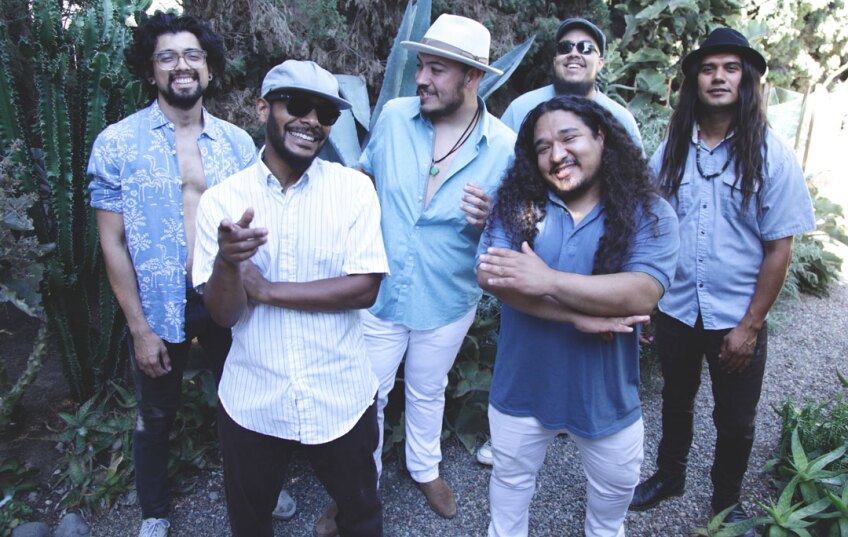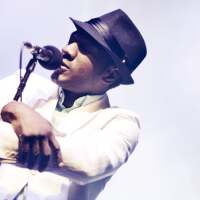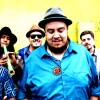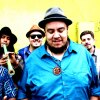Buyepongo's Sound Knocks Down the Negative

Punk. Hip-hop. Cumbia. The sounds of Los Angeles — indeed, the sounds of the world — have influenced Buyepongo. This local band, whose line-up expands and contracts as needed, takes those disparate influences and lets them simmer together to make music that doesn't stick to one genre. In fact, Buyepongo has a name that they concocted for the sounds they make: buyangú. And they developed that sound over years of playing across the city. They played very public venues, like parks, to crowds that could contain, well, virtually any demographic that lives in the city. Building and bridging communities is at the heart of what Buypongo does.
"We believe that everything we do is for seven generations and that's our drive, that's our passion...."
"Our community is everything for us," says Edgar "Big Mesh" Modesto, a drummer and, essentially, the leader of Buyepongo, in an on-air interview with Studio A. "Without the community, there is definitely no Buyepongo."
He adds, "We view our communities as our families, our inner circle, our community, which is our neighborhood and our community of Los Angeles and the community of the world."
On the most basic level, the gift they give to communities is music and a place to dance. "What we want to do is give our folks a proper dance floor, a proper place where they can come and be themselves, where there are no borders, there's no race, there's no age," says Modesto. "It's intergenerational, gender-neutral, everything like that."
For Buyepongo, community is part of the art. "At our shows, our performances, the interaction of the community to us is pretty much the most important thing that we want to be able to ignite. Once we ignite that energy between us, we can do anything," says Modesto. Part of how they do that is by making music that reflects a borderless space. "This is a future sound, but it also has a root," says the drummer, who plays an instrument called conguira that is a hybrid conga, guacharaca and kick drum. "You might be from Peru. You might be from New York. You might be from West Africa. There's a root to all that, but it comes all back down to the West Coast, L.A. "
Buyepongo, though, are more than musicians. Modesto describes the members of the band as "maestros," or teachers. "We believe that everyone is a teacher," he says.
He continues, "We've learned so many lessons from regular folks down the street. Our parents. Our community members." Modesto mentions a late, Leimert Park drummer who taught him and a few other friends how to drum. "We took those things and took it to our circle and now, we believe that we're maestros also, with my daughter, with my nephews, with their nephews, with the kids in our community, it's kind of like, you can learn this too," Modesto says. "We believe that everything we do is for seven generations and that's our drive, that's our passion. The music kind of reflects that. We want it to be, we plant the seed and it's going to harvest and down the road, more trees will grow in the music."
The members of Buyepongo have also worked with youth by leading workshops at venues like the Skirball Center and at elementary schools. They teach kids how to understand and transmit the emotion of music as well as the practical and technical side of it. They'll have a "Speak Your Heart" drum circle, where kids play and it doesn't matter that they don't know how to play the drums yet.
"The faces, the reaction, to us, it's priceless. It's kind of like reminds me of how I felt," says Modesto. "I didn't get to touch a drum or a conga until I was 15 or 16 years old. A lot of people don't get to ever touch a drum. So, I feel that when I give a drum to a little six year old, seven year old, it's a natural right to do music. Buyepongo wants to provide that space wherever we go. "

Buyepongo has been part of the Schools Not Prisons tour produced by Revolve Impact, and supported by The California Endowment and The California Wellness Foundation, where musicians perform in part to raise awareness about the prison-industrial complex.
"The prison-industrial complex affects a lot in our community, especially being folks of color and the way the system is set up to systematically put people in prison," says Modesto in an off-camera interview. "We feel like music is a big, important way to bring awareness to social issues, raise awareness to what's going on in our community."
As the members of Buyepongo became more active in Schools Not Prisons, they also became more aware of what happens when people are incarcerated. "We met a lot of people that were in isolation, locked up for 25 plus years and how they're supposed to be recovering and they're expected to come back fixed with all their issues."
Modesto says that a lot of their community-oriented work has to do with education and lifestyle. It's sharing heritage and history and learning how to meld tradition with the modern world. "We all live here in this country. We all love living here," says Modesto. "We love doing our thing, but, at the same time, a lot of things are being lost, a lot of traditions, so the music has brought us back full circle to that, to be able to understand a lot of our traditions, where we come from."
Buyepongo is currently preparing to release their sophomore album, Tumbalo. The title is derived from the Spanish verb tumbar — "to knock something down," Modesto explains. "You're going to go on the dance floor? Knock it down. If they're trying to build a border around you, you can't reach certain places? Better knock those walls down too," says Modesto. "People try to put some type, you can't do it because you're a woman or because of your sexual orientation. We knock those things out of the water. We do that with the sound of the drum. We let them know that as a people, we are unstoppable."
Top Image: Buyepongo performing at Studio A







